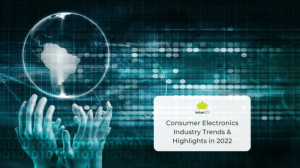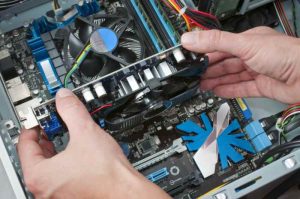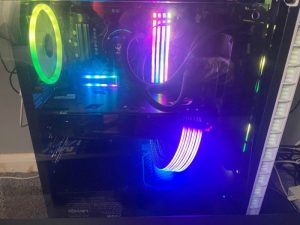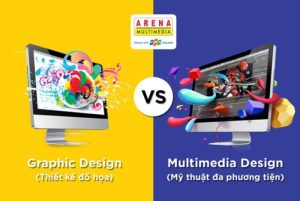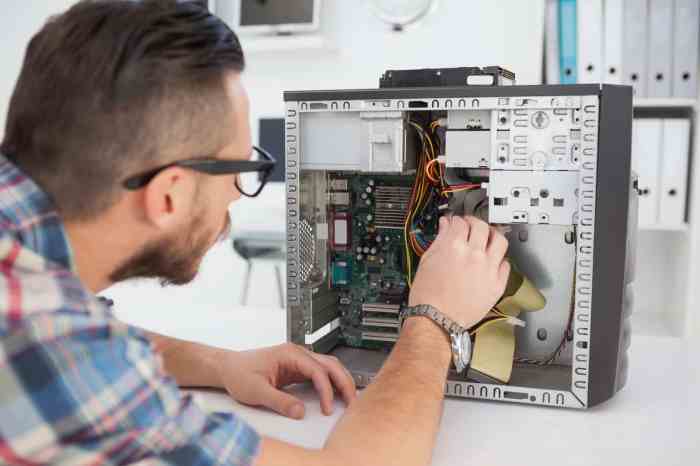
Are you tired of your computer acting up? Dive into our PC repair and maintenance tips to keep your device in top shape. From troubleshooting common issues to optimizing performance, we’ve got you covered!
PC Repair and Maintenance Tips
Regular maintenance is crucial for keeping your PC running smoothly and preventing issues down the line. By performing simple tasks regularly, you can extend the lifespan of your computer and improve its performance significantly.Common issues that can arise with PCs include slow performance, overheating, software crashes, and hardware failures. To troubleshoot these issues, you can start by cleaning your PC’s internal components, updating software and drivers, checking for malware, and ensuring proper ventilation.
Optimizing PC Performance
- Clear out unnecessary files and programs to free up disk space and improve speed.
- Run disk cleanup and defragmentation regularly to optimize storage and speed up access to files.
- Manage startup programs to reduce boot time and improve overall performance.
- Keep software and drivers up to date to ensure compatibility and security.
- Monitor system temperature and clean out dust from fans and vents to prevent overheating.
Electronics and Electrical
When it comes to PCs, electronics play a crucial role in their functionality. From powering up the system to processing data and displaying images on the screen, electronics are essential components that keep the computer running smoothly.
Common Electrical Components in a PC and Their Functions
- The motherboard: This is the main circuit board where all other components are connected. It houses the CPU, RAM, and other essential parts.
- Power supply unit (PSU): Responsible for providing power to all components in the PC.
- Central Processing Unit (CPU): The brain of the computer, responsible for executing instructions and performing calculations.
- Random Access Memory (RAM): Temporarily stores data that the CPU needs to access quickly.
- Hard Drive or Solid State Drive (HDD/SSD): Stores all your data, from the operating system to your files and applications.
- Graphics Processing Unit (GPU): Handles all graphics-related tasks, including rendering images and videos.
Safety Tips for Handling Electronics When Repairing or Maintaining a PC
- Always unplug the PC from the power source before attempting any repairs or maintenance.
- Avoid static electricity by grounding yourself before touching any electronic components.
- Handle components with care and avoid touching any sensitive parts directly.
- Use proper tools and equipment to avoid damaging the components or injuring yourself.
- Follow manufacturer guidelines and instructions when installing or replacing any electronic parts.
Computer Repair and Consulting
When it comes to computer repair and consulting, there are different approaches that users can take depending on the complexity of the issue. DIY PC repair, where users attempt to fix their computer problems themselves, is a common choice for minor issues. On the other hand, professional consulting services offer expert assistance for more complicated problems that require specialized knowledge and tools.
Difference between DIY PC Repair and Professional Consulting Services
- DIY PC Repair:
- Cost-effective for minor issues
- Allows users to learn more about their computer
- Risk of causing further damage if not done correctly
- Professional Consulting Services:
- Expertise and specialized knowledge
- Access to advanced diagnostic tools
- Guaranteed solutions for complex problems
Tips for Choosing a Reliable Computer Repair Service
Before selecting a computer repair service, consider the following tips:
- Check reviews and recommendations from trusted sources
- Inquire about the technicians’ certifications and experience
- Avoid services with unclear pricing or hidden fees
- Ask about warranty and guarantees for the repair work
- Ensure the service provider offers a detailed diagnosis of the issue
Benefits of Seeking Professional Help for Complex PC Issues
Professional help for complex PC issues can offer several benefits:
- Expertise: Professionals have the knowledge and skills to diagnose and fix intricate problems.
- Time-saving: Professional services can quickly resolve issues that might take DIY users a significant amount of time to address.
- Long-term solution: Professional repairs often come with warranties, ensuring that the issue is fully resolved.
- Prevent further damage: Professionals can identify underlying issues that DIY repairs might overlook, preventing future problems.
Data Communication
Data communication plays a crucial role in PC systems as it involves the transmission of data between different devices and networks. It enables the sharing of information, files, and resources, making it essential for the functionality of computers.
Common Data Communication Issues
- Slow data transfer speeds: One common issue is slow data transfer speeds, which can be caused by network congestion, outdated hardware, or software issues. To resolve this, you can try updating your network drivers, checking for malware, or upgrading your hardware.
- Interference and signal loss: Interference from other electronic devices or physical barriers can disrupt data communication and lead to signal loss. To address this, you can reposition your devices, use shielding, or invest in signal boosters.
- Security vulnerabilities: Data communication can be at risk of security breaches, such as hacking or data interception. To secure your data communication, you can use encryption, strong passwords, and firewalls to protect your information.
Computers E-Books

E-books are a valuable resource for learning about computer repair and maintenance, offering convenience and accessibility to a wealth of information at your fingertips. Whether you are a beginner looking to acquire basic skills or an experienced technician seeking advanced knowledge, e-books can provide detailed instructions, troubleshooting tips, and step-by-step guides to help you enhance your computer repair skills.
Benefits of E-Books for Learning Computer Repair
- Easily accessible anytime, anywhere, without the need for physical books.
- Cost-effective compared to purchasing traditional books.
- Interactive features such as videos, animations, and quizzes to enhance learning.
- Regular updates and new editions available instantly.
Recommended E-Books for Beginners in PC Repair
- “CompTIA A+ Certification All-in-One Exam Guide” by Mike Meyers
- “Upgrading and Repairing PCs” by Scott Mueller
- “The Complete Idiot’s Guide to Computer Basics” by Joe Kraynak
How E-Books Enhance Knowledge and Skills in Computer Maintenance
E-books provide in-depth explanations, visual aids, and practical exercises to help readers understand complex concepts and techniques in computer maintenance. By following the instructions and tips provided in e-books, beginners can build a solid foundation of knowledge, while experienced professionals can stay updated on the latest industry trends and best practices in computer repair and maintenance.
Graphics and Multimedia

When it comes to PC performance, graphics and multimedia play a significant role. The quality of graphics and multimedia content can impact how smoothly your computer runs and how quickly it can process tasks. Understanding how to optimize these settings can help improve overall performance and enhance your user experience.
Impact of Graphics and Multimedia on PC Performance
Graphics and multimedia content require a lot of resources from your computer, including CPU, GPU, and RAM. High-definition videos, graphic-intensive games, and large image files can put a strain on your system, leading to slower performance, increased load times, and potential crashes. It’s essential to strike a balance between visual quality and system resources to ensure optimal performance.
- High-resolution images and videos can consume a significant amount of VRAM, affecting overall system responsiveness.
- Running multiple multimedia applications simultaneously can lead to resource contention and slowdowns.
- Outdated graphics drivers can cause compatibility issues and performance bottlenecks.
Common Issues Related to Graphics and Multimedia in PCs
Graphics and multimedia issues can manifest in various ways, impacting both visual quality and system performance. By addressing these common issues, you can ensure a smoother multimedia experience and better overall PC performance.
- Screen tearing and artifacts during video playback or gaming.
- Blurry or distorted images due to incorrect display settings.
- Audio-video synchronization issues in multimedia content.
- Overheating of GPU during graphic-intensive tasks.
Tips for Optimizing Graphics and Multimedia Settings
Optimizing your graphics and multimedia settings can help alleviate performance issues and enhance visual quality. By following these tips, you can strike a balance between aesthetics and efficiency, ensuring a seamless multimedia experience on your PC.
- Update graphics drivers regularly to ensure compatibility and performance improvements.
- Adjust display settings to match the resolution and refresh rate of your monitor.
- Use hardware acceleration where available to offload processing tasks from the CPU.
- Close unnecessary multimedia applications running in the background to free up system resources.
Computers Hardware
When it comes to computers, hardware plays a crucial role in determining the performance and capabilities of your PC. Understanding the essential hardware components, how upgrades can enhance performance, and tips for maintenance are key to optimizing your computer’s lifespan.
Essential Hardware Components of a PC
- Central Processing Unit (CPU): Often referred to as the brain of the computer, the CPU processes instructions and performs calculations.
- Random Access Memory (RAM): This temporary memory allows the CPU to access data quickly, improving multitasking capabilities.
- Hard Disk Drive (HDD) or Solid State Drive (SSD): These storage devices store data permanently and enable the operating system and software to run smoothly.
- Motherboard: The main circuit board that connects all components of the computer together.
- Graphics Processing Unit (GPU): Responsible for rendering images and videos, crucial for gaming and graphic-intensive tasks.
How Hardware Upgrades Improve PC Performance
- Upgrading RAM can enhance multitasking capabilities and overall system speed.
- Replacing an HDD with an SSD can significantly reduce boot times and improve overall system responsiveness.
- Upgrading the CPU or GPU can boost performance in tasks like gaming, video editing, and graphic design.
Tips for Cleaning and Maintaining Computer Hardware
- Regularly clean dust and debris from fans, vents, and heat sinks to prevent overheating and hardware damage.
- Avoid eating or drinking near your computer to prevent spills that can damage internal components.
- Use compressed air to clean hard-to-reach areas and remove built-up dust that can hinder airflow.
- Update drivers and firmware regularly to ensure hardware components are functioning optimally.
Closing Summary
Don’t let your computer woes get you down. With these tips at your fingertips, you can ensure your PC stays running smoothly and efficiently. Say goodbye to tech troubles and hello to a well-maintained device!
Top FAQs
How often should I perform maintenance on my PC?
You should aim to perform basic maintenance tasks like cleaning your PC and updating software at least once a month.
What are some signs that indicate my PC needs repair?
Symptoms like slow performance, unusual noises, and frequent crashes are indicators that your PC may need attention.
Can I optimize my PC’s performance without professional help?
Absolutely! You can improve performance by removing unnecessary programs, updating drivers, and managing startup processes.

